-
 Bitcoin
Bitcoin $84,051.1767
-0.66% -
 Ethereum
Ethereum $1,610.2058
-1.11% -
 Tether USDt
Tether USDt $1.0000
0.03% -
 XRP
XRP $2.1239
-1.01% -
 BNB
BNB $582.4857
-0.63% -
 Solana
Solana $128.2753
-1.22% -
 USDC
USDC $0.9999
0.01% -
 TRON
TRON $0.2511
-0.27% -
 Dogecoin
Dogecoin $0.1556
-1.95% -
 Cardano
Cardano $0.6206
-2.15% -
 UNUS SED LEO
UNUS SED LEO $9.3675
-0.08% -
 Chainlink
Chainlink $12.4182
-2.63% -
 Avalanche
Avalanche $19.3993
-3.96% -
 Stellar
Stellar $0.2398
0.69% -
 Toncoin
Toncoin $2.9500
3.61% -
 Shiba Inu
Shiba Inu $0.0...01182
-1.42% -
 Sui
Sui $2.1274
-2.89% -
 Hedera
Hedera $0.1595
-3.86% -
 Bitcoin Cash
Bitcoin Cash $323.0041
-0.34% -
 Litecoin
Litecoin $75.7465
-1.58% -
 Polkadot
Polkadot $3.5878
-3.38% -
 Dai
Dai $1.0001
0.02% -
 Bitget Token
Bitget Token $4.2823
0.13% -
 Hyperliquid
Hyperliquid $15.3042
-1.99% -
 Ethena USDe
Ethena USDe $0.9992
0.03% -
 Pi
Pi $0.6653
-9.93% -
 Monero
Monero $214.4529
-0.63% -
 Uniswap
Uniswap $5.2568
-2.44% -
 OKB
OKB $51.0246
-3.49% -
 Pepe
Pepe $0.0...06993
-4.63%
How do blockchain games achieve the real-world value conversion of in-game assets?
Blockchain games convert in-game assets into real-world value using NFTs, cryptocurrencies, and smart contracts, enabling players to own, trade, and monetize their digital items.
Apr 14, 2025 at 09:57 pm
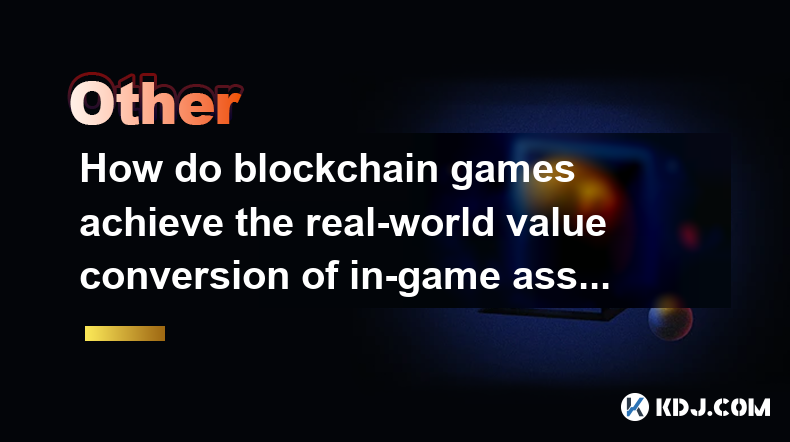
Blockchain games have revolutionized the gaming industry by enabling players to own, trade, and monetize in-game assets. The key to achieving real-world value conversion of these assets lies in the integration of blockchain technology and the use of cryptocurrencies. In this article, we will explore the mechanisms through which blockchain games facilitate the conversion of in-game assets into real-world value.
The Role of Non-Fungible Tokens (NFTs)
Non-Fungible Tokens (NFTs) are at the heart of blockchain gaming's ability to convert in-game assets into real-world value. NFTs are unique digital assets that represent ownership of a specific item or piece of content on the blockchain. In the context of gaming, NFTs can represent characters, weapons, skins, virtual land, or any other in-game item.
- Creation of NFTs: Game developers create NFTs by minting them on a blockchain, such as Ethereum or Binance Smart Chain. Each NFT is assigned a unique identifier and is linked to specific metadata that describes the asset.
- Ownership and Transfer: Players can acquire NFTs through gameplay, purchases, or trading with other players. Ownership of an NFT is recorded on the blockchain, ensuring transparency and security. Players can transfer their NFTs to other wallets or marketplaces at any time.
- Value Determination: The value of an NFT is determined by factors such as rarity, utility, and demand within the game's ecosystem. Players can sell their NFTs on various marketplaces, converting them into cryptocurrencies like ETH or BNB.
Integration of Cryptocurrencies
Cryptocurrencies play a crucial role in the real-world value conversion of in-game assets. They serve as the medium of exchange between the virtual and real worlds, allowing players to convert their digital assets into tangible value.
- In-Game Economy: Many blockchain games have their own native cryptocurrencies, which are used for transactions within the game. These tokens can be earned through gameplay, such as completing quests or participating in tournaments.
- Conversion to Fiat: Players can convert their in-game cryptocurrencies into more widely accepted cryptocurrencies like Bitcoin or Ethereum. From there, they can use cryptocurrency exchanges to convert their holdings into fiat currencies such as USD or EUR.
- Marketplaces and Exchanges: Various decentralized and centralized marketplaces facilitate the trading of in-game assets and cryptocurrencies. Players can list their NFTs and tokens for sale, setting their own prices and terms.
Smart Contracts and Decentralized Governance
Smart contracts and decentralized governance mechanisms are essential for ensuring the integrity and fairness of in-game asset transactions. Smart contracts automate the execution of agreements between players, ensuring that transactions are carried out as intended.
- Automated Transactions: When a player decides to sell an NFT, a smart contract can automatically transfer ownership to the buyer upon receipt of payment. This eliminates the need for intermediaries and reduces the risk of fraud.
- Royalties and Revenue Sharing: Some blockchain games implement smart contracts that allow creators to receive royalties on secondary sales of their NFTs. This incentivizes the creation of high-quality content and fosters a vibrant in-game economy.
- Decentralized Governance: Many blockchain games operate on decentralized platforms, where decisions about game development and economics are made by the community. Players can vote on proposals and changes, ensuring that the game's direction aligns with their interests.
Use Cases and Examples
Several blockchain games have successfully implemented mechanisms for converting in-game assets into real-world value. Here are a few notable examples:
- Axie Infinity: In Axie Infinity, players can breed, battle, and trade creatures called Axies, which are represented as NFTs. Players can earn the game's native cryptocurrency, AXS, by participating in battles and other activities. AXS can be traded on cryptocurrency exchanges for other cryptocurrencies or fiat currencies.
- Decentraland: Decentraland is a virtual world where players can buy, sell, and develop virtual land parcels, which are represented as NFTs. Players can monetize their land by hosting events, creating content, or selling virtual goods. The game's native cryptocurrency, MANA, can be used for transactions and converted into other cryptocurrencies.
- CryptoKitties: CryptoKitties is one of the earliest blockchain games, where players can collect, breed, and trade unique digital cats represented as NFTs. The value of each CryptoKitty is determined by its rarity and genetic traits. Players can sell their CryptoKitties on marketplaces, converting them into ETH.
Challenges and Considerations
While blockchain games offer exciting opportunities for converting in-game assets into real-world value, there are several challenges and considerations that players and developers must be aware of.
- Volatility: The value of cryptocurrencies and NFTs can be highly volatile, which can impact the real-world value of in-game assets. Players should be cautious and consider the risks before investing significant time or money into blockchain games.
- Regulatory Uncertainty: The regulatory landscape surrounding cryptocurrencies and NFTs is still evolving. Players and developers must stay informed about legal developments in their jurisdictions to ensure compliance.
- Scalability and Performance: Blockchain networks can face scalability issues, leading to high transaction fees and slow processing times. Game developers must optimize their systems to ensure a smooth player experience.
- Security and Fraud: While blockchain technology offers enhanced security, it is not immune to fraud and scams. Players should take steps to protect their digital assets, such as using secure wallets and verifying the authenticity of NFTs before purchasing.
FAQs
Q: Can I convert in-game assets from traditional games into real-world value using blockchain technology?
A: No, traditional games do not typically use blockchain technology or NFTs, so their in-game assets cannot be directly converted into real-world value through blockchain mechanisms. However, some traditional games may offer in-game marketplaces where players can trade virtual items for real money, but these transactions are not facilitated by blockchain technology.
Q: How do I ensure the authenticity of an NFT before purchasing it?
A: To ensure the authenticity of an NFT, you should:
- Check the NFT's unique identifier and metadata on the blockchain to verify its origin and ownership history.
- Use reputable marketplaces that have verification processes in place to prevent the listing of fraudulent NFTs.
- Research the seller's reputation and history on the platform to ensure they are trustworthy.
- Look for any official certifications or endorsements from the game developers or creators associated with the NFT.
Q: What are the tax implications of converting in-game assets into real-world value?
A: The tax implications of converting in-game assets into real-world value can vary depending on your jurisdiction. In many countries, the conversion of cryptocurrencies and NFTs into fiat currency may be subject to capital gains tax. It is important to consult with a tax professional to understand your specific obligations and to keep accurate records of your transactions.
Q: Can I use in-game assets from one blockchain game in another game?
A: Generally, in-game assets are specific to the game in which they were created and cannot be directly used in another game. However, some blockchain games may support interoperability, allowing certain assets to be used across different games within the same ecosystem. Always check the specific rules and capabilities of each game before attempting to use assets across different platforms.
Disclaimer:info@kdj.com
The information provided is not trading advice. kdj.com does not assume any responsibility for any investments made based on the information provided in this article. Cryptocurrencies are highly volatile and it is highly recommended that you invest with caution after thorough research!
If you believe that the content used on this website infringes your copyright, please contact us immediately (info@kdj.com) and we will delete it promptly.
- Sweden Democrats Are Pushing for the Country to Adopt a National Bitcoin Strategy
- 2025-04-16 04:05:12
- Troller Cat ($TCAT) Leads the New Wave of Meme Coins in 2025
- 2025-04-16 04:05:12
- Bitcoin (BTC) price teased above $86k for the first time, on Tuesday during the mid-New York session
- 2025-04-16 04:00:13
- This week's MANTRA Meltdown has left the crypto market and regulators seeking answers.
- 2025-04-16 04:00:13
- Rexas Finance (RXS) Is Ready to Steal the Show from Pepe Coin (PEPE) in the 2025 Bull Run
- 2025-04-16 03:55:12
- Trump Administration Could Use Tariff Revenue to Buy Bitcoin (BTC)
- 2025-04-16 03:55:12
Related knowledge
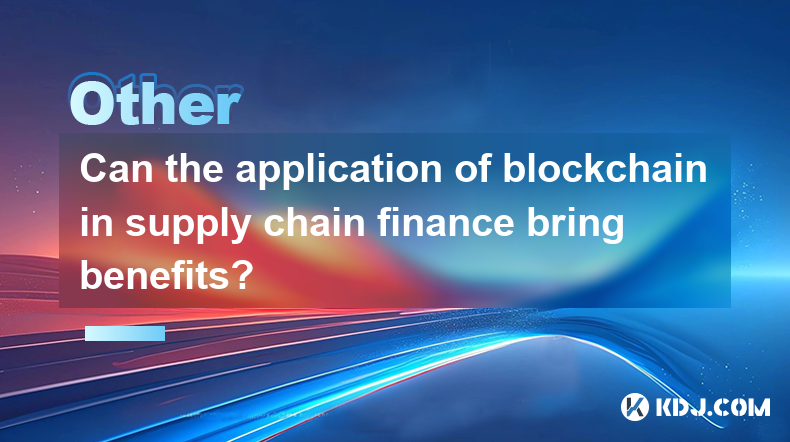
Can the application of blockchain in supply chain finance bring benefits?
Apr 15,2025 at 04:00pm
Can the application of blockchain in supply chain finance bring benefits? The integration of blockchain technology into supply chain finance has garnered significant attention in the cryptocurrency and financial sectors. This article explores how blockchain can potentially revolutionize supply chain finance, detailing its benefits and providing a compre...

Does the ranking of Chinese blockchain apps include cross-chain applications?
Apr 14,2025 at 04:00pm
The ranking of Chinese blockchain apps is a comprehensive evaluation that takes into account various aspects such as user base, transaction volume, and technological innovation. A pertinent question arises regarding whether these rankings include cross-chain applications. Cross-chain applications, which allow different blockchain networks to interact an...
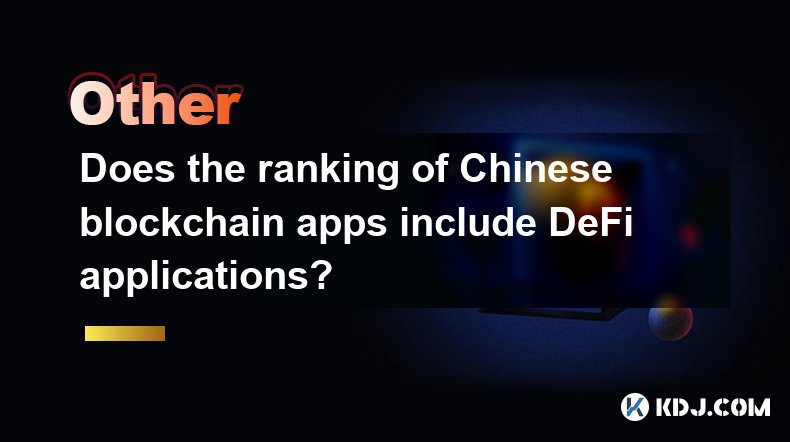
Does the ranking of Chinese blockchain apps include DeFi applications?
Apr 15,2025 at 06:57am
The ranking of Chinese blockchain apps is a comprehensive list that showcases the most popular and influential applications within the cryptocurrency ecosystem. One question that often arises is whether these rankings include DeFi applications. To answer this, we need to delve into the specifics of how these rankings are compiled and what types of appli...
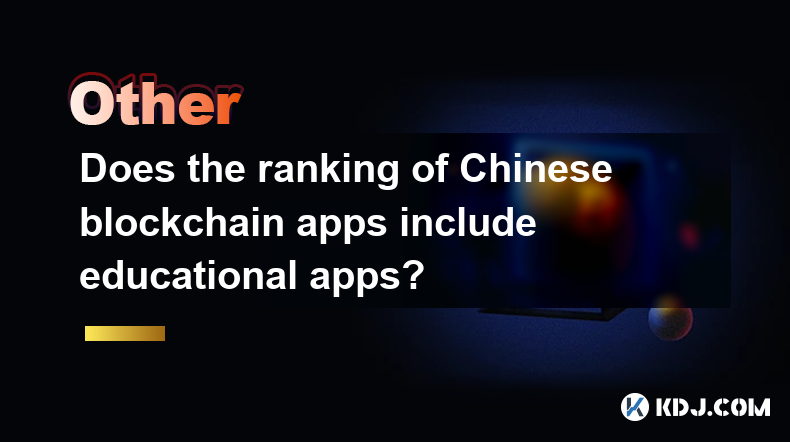
Does the ranking of Chinese blockchain apps include educational apps?
Apr 16,2025 at 03:35am
The ranking of Chinese blockchain apps often includes a variety of categories, from finance and gaming to social networking and beyond. One question that frequently arises is whether these rankings include educational apps. To address this, we need to delve into the specifics of how blockchain apps are categorized and ranked in China, and whether educat...
Does the ranking of Chinese blockchain apps include enterprise-level applications?
Apr 15,2025 at 06:42am
The ranking of Chinese blockchain apps often includes a variety of applications, ranging from consumer-focused to enterprise-level solutions. Understanding the scope and criteria for these rankings is essential to determine if enterprise-level applications are included. This article delves into the specifics of how Chinese blockchain app rankings are co...
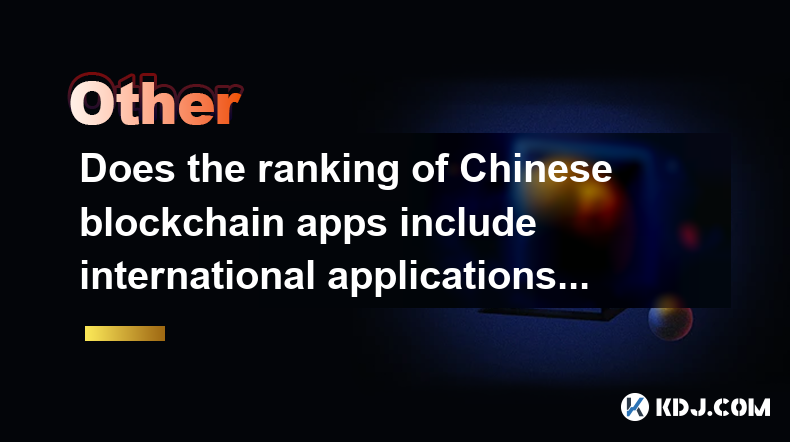
Does the ranking of Chinese blockchain apps include international applications?
Apr 16,2025 at 04:07am
The ranking of Chinese blockchain apps primarily focuses on applications developed and predominantly used within China. However, the question of whether these rankings include international applications is an intriguing one that warrants a detailed exploration. In this article, we will delve into the criteria used for ranking Chinese blockchain apps, th...

Can the application of blockchain in supply chain finance bring benefits?
Apr 15,2025 at 04:00pm
Can the application of blockchain in supply chain finance bring benefits? The integration of blockchain technology into supply chain finance has garnered significant attention in the cryptocurrency and financial sectors. This article explores how blockchain can potentially revolutionize supply chain finance, detailing its benefits and providing a compre...

Does the ranking of Chinese blockchain apps include cross-chain applications?
Apr 14,2025 at 04:00pm
The ranking of Chinese blockchain apps is a comprehensive evaluation that takes into account various aspects such as user base, transaction volume, and technological innovation. A pertinent question arises regarding whether these rankings include cross-chain applications. Cross-chain applications, which allow different blockchain networks to interact an...

Does the ranking of Chinese blockchain apps include DeFi applications?
Apr 15,2025 at 06:57am
The ranking of Chinese blockchain apps is a comprehensive list that showcases the most popular and influential applications within the cryptocurrency ecosystem. One question that often arises is whether these rankings include DeFi applications. To answer this, we need to delve into the specifics of how these rankings are compiled and what types of appli...

Does the ranking of Chinese blockchain apps include educational apps?
Apr 16,2025 at 03:35am
The ranking of Chinese blockchain apps often includes a variety of categories, from finance and gaming to social networking and beyond. One question that frequently arises is whether these rankings include educational apps. To address this, we need to delve into the specifics of how blockchain apps are categorized and ranked in China, and whether educat...

Does the ranking of Chinese blockchain apps include enterprise-level applications?
Apr 15,2025 at 06:42am
The ranking of Chinese blockchain apps often includes a variety of applications, ranging from consumer-focused to enterprise-level solutions. Understanding the scope and criteria for these rankings is essential to determine if enterprise-level applications are included. This article delves into the specifics of how Chinese blockchain app rankings are co...

Does the ranking of Chinese blockchain apps include international applications?
Apr 16,2025 at 04:07am
The ranking of Chinese blockchain apps primarily focuses on applications developed and predominantly used within China. However, the question of whether these rankings include international applications is an intriguing one that warrants a detailed exploration. In this article, we will delve into the criteria used for ranking Chinese blockchain apps, th...
See all articles























































































